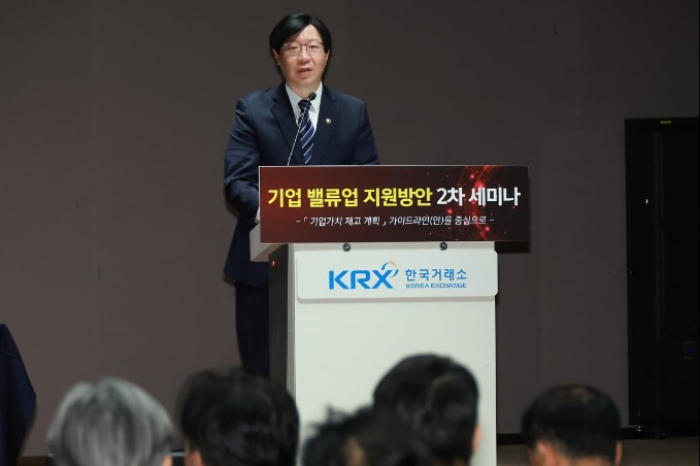Korean stock market
Kospi 200 firms' values sharply below MSCI developed market rivals
Korea's 200 largest publicly traded stock's P/B ratio is 1.0, less than one-third the MSCI developed market average
By May 03, 2024 (Gmt+09:00)
1
Min read
Most Read
LG Chem to sell water filter business to Glenwood PE for $692 million


Kyobo Life poised to buy Japan’s SBI Group-owned savings bank


KT&G eyes overseas M&A after rejecting activist fund's offer


StockX in merger talks with Naver’s online reseller Kream


Mirae Asset to be named Korea Post’s core real estate fund operator



South Korea’s listed firms are undervalued compared with companies in public markets of developed and emerging countries, according to the Korea Exchange (KRX) on Friday.
The price-to-book (P/B) ratio of the firms on the Kospi 200 Index was 1.0, based on their closing prices on May 2 and 2023 year-end financial statements, KRX found. The index is comprised of the 200 largest traded local stocks on the main bourse, representing around 90% of the KRX’s total market value.
The P/B ratio indicates a company’s market value compared with its book value. If the ratio is 1.0, the stock is trading at its book value; if it is below 1.0, the stock is undervalued.
The 200 largest firms’ P/B ratio compares with the average of 3.2 from the 23 developed markets and 1.7 from the 24 emerging markets on MSCI indices, KRX said.
Some 40% of Korean listed firms have a P/B ratio of less than 1.0. The Korean government strives to boost the local stock value based on the so-called corporate value-up program, which encourages companies to value themselves, set up concrete roadmaps to increase their values and regularly disclose the outcomes.
By country in the developed markets, the US scored the top P/B ratio at 4.7, followed by France and the UK, both at 2.1, and Japan at 1.6.
In the emerging markets, India posted a 4.4 P/B ratio, while Taiwan and China logged 2.7 and 1.2 ratios, respectively.
Again, based on their closing prices on May 2 and 2023 year-end financial statements, the P/B ratio of all Kospi-listed firms remained 1.0 for the second year in a row as their market caps and total equity capital increased at a similar rate, KRX added.
The price-to-earnings (P/E) ratio of the Kospi-listed companies rose to 20.7 from 13.3 a year earlier. This is because their combined market cap has increased since the fourth quarter of the last year on expectations of economic recovery, despite declines in net profit amid the overall slowdown throughout the year, KRX said.
The dividend yield of the Kospi 200 firms was 2.0%, above the developed markets’ average of 1.9% and below emerging countries’ 2.7%.
Write to See-Eun Lee at see@hankyung.com
Jihyun Kim edited this article.
More to Read
-
 Korean stock marketKorea announces measures to upvalue local shares
Korean stock marketKorea announces measures to upvalue local sharesFeb 26, 2024 (Gmt+09:00)
2 Min read -
 Korean stock marketNPS to invest up to $8.2 bn in undervalued Korean stocks
Korean stock marketNPS to invest up to $8.2 bn in undervalued Korean stocksMar 01, 2024 (Gmt+09:00)
3 Min read -
 The KED ViewDefy convention with long-run plans to upvalue Korean stocks
The KED ViewDefy convention with long-run plans to upvalue Korean stocksFeb 23, 2024 (Gmt+09:00)
4 Min read
Comment 0
LOG IN


